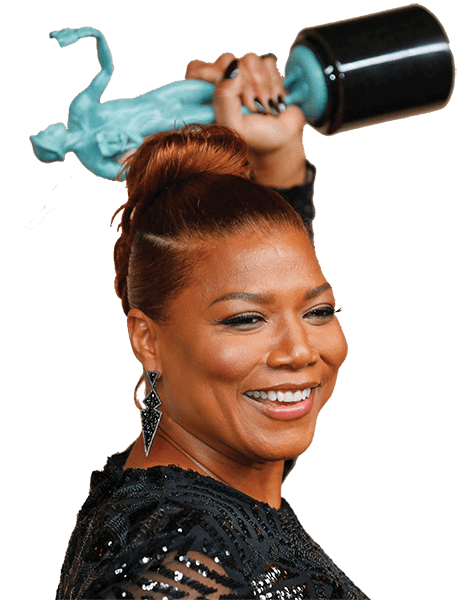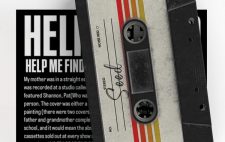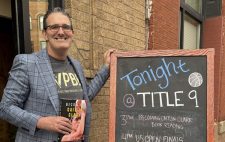Queen Latifah knows what it’s like to live at the top. During the golden age of hip hop, she reigned supreme. Since then, she’s starred in movies, produced TV shows, authored books, hosted a talk show, appeared on Broadway – she’s pretty much done it all and has the awards to prove it (a Grammy, an Emmy, a Golden Globe and lots of others). She’s had so many successes it’s easy to forget what a long and accomplished career she’s had. But here’s something to always remember: she’s a Jersey Girl. Watch her closely, and you’ll clearly see how she owns that title and everything it means.
For Queen Latifah, being from New Jersey is a source of great pride. She won’t hesitate to tell you her Jersey Girl roots helped get her to where she is now, which is at the very top of a long, successful career in entertainment.
“People from New Jersey have this thing about us,” she says. “If you can grow up here, you can go anywhere in the world.”
She should know, because she’s been almost everywhere and done so, so much. For the past 30 years, she’s been captivating fans in pretty much every entertainment genre: movies, music, books, the stage. And now she has returned to television, playing the lead role in a reboot of the TV classic, “The Equalizer.” The show premiered after the Super Bowl and drew massive audiences, which increased in the following days thanks to live-streaming. But even with this latest project, the girl from New Jersey hasn’t forgotten her roots.
“I think the Jersey influence is the bones of the show,” says Latifah, a Newark native. “It’s in everything we do. I’m hoping that it does translate, that it does come across in how we shoot, how we feel, how I’m able to play this role and what I’m able to bring across on camera.”
Filmed at the start of the pandemic last spring and summer, the first season was shot entirely in New Jersey. A large portion of the cast and crew hail from the state.
“We’ve been through a lot this year,” says Latifah. “It’s nice to bring some business here to New Jersey, right back home, right back where it all started to make sure that there are some people here who have the opportunity to put food on the table every week.”
“When we started this project,” she adds, “little did we know that we would face a pandemic, we would face such amazing divisiveness in this country, we would have to deal with a real, real hard look at the racial inequities, the social inequities and the financial inequities of this country.”
But for her, it goes deeper. In “The Equalizer,” Latifah plays Robyn McCall, an ex-CIA operative turned vigilante. She’s a Black single mom with elite military skills who’s on a mission to help people who have nowhere else to turn. McCall is tough – and Latifah says she has drawn on her own experiences and her roots to play the part.
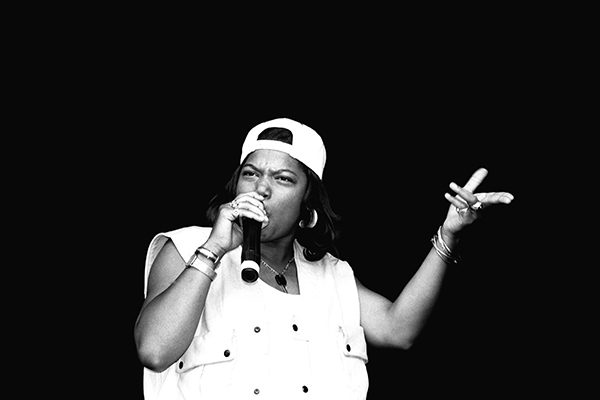
Queen Latifah in 1993. Photo: RTJohnson / MediaPunch
Born Dana Owens, Latifah’s ascension to the hip hop throne in the early days of her career came alongside some of the darker moments of her life. When her brother died in a motorcycle crash in 1994, it threw her life completely out of whack. His death at age 24, she has said, caused her to question her career, her life and her faith. The following year, Latifah was carjacked. Her close friend was shot and nearly died in her arms. After that, she carried a loaded handgun in her car until she was pulled over and charged for possession of a weapon and marijuana a year later. For years, she says, she struggled with alcohol abuse that eventually led to a DUI charge in 2002.
When watching Latifah play the battle-hardened McCall, it’s easy to see she was made for the role. Or at least, it was made for her. She’s the first woman Equalizer following the late Edward Woodward, who starred in the CBS show in the 1980s, and then Denzel Washington, who equalized in 2 motion pictures in the last decade. Latifah, a fan of both the original TV series and the darker movies, says she was sold on the idea of having a woman of color take the reins.
“Black women have been equalizing for years and years and years, and that’s from Hatshepsut [a female Egyptian pharaoh] to Stacey Abrams to Kamala Harris to my mother to my grandmother,” says Latifah. “For me, seeing a Black woman equalizing is not a new thing. Seeing it on network TV once every week may be a little newer.”
Latifah is only the 4th Black woman to carry a major network drama, following in the footsteps of Kerry Washington (“Scandal”), Viola Davis (“How to Get Away with Murder”) and Theresa Graves (“Get Christie Love!”). And, she says, it’s time for that to change.
“Women have been doing what we have to do, and we’ve been carrying a lot of things on our back,” she says. “Unfortunately, sometimes we’re not lifted up the way we should be when it comes to how much we actually carry, how much grit we have, how much determination we have, how powerful we are and how magical we are. It’s time for the world to see it on a normal basis through the lens of a Black woman – me.”
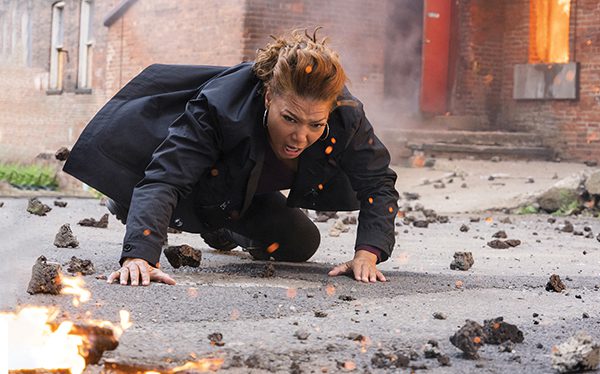
Queen Latifah as Robyn McCall in “The Equalizer” Photo: Barbara Nitke/CBS
Fans of Equalizers past will be happy to know that Latifah can pack a mean punch. Although she has a stunt team, she does do a lot of her own close-contact fighting. That, she says, isn’t easy.
“There’s a lot of dance to it,” says Latifah, who says she and her siblings learned to fight from her father, who was in law enforcement. “It’s choreography, it’s learning things by beat.”
Fortunately for her, she can take her sense of rhythm honed from decades of being a rapper, singer and dancer directly into the scene. “It becomes a song in my mind,” says Latifah. “I gotta whoop you by the time that hook comes. I have to have this fight over by the time the chorus is over in my brain.”
It’s pulled out a side in her that, at 51, even she didn’t know she had.
“When someone tries to blow me up, when I get off the ground and I decide I’m going to get you back, there’s this look on my face and I’m like, ‘Oh, that’s a good look. Even I’m scared,’” says Latifah.
Echoing themes she’s taken from her hip hop days and returned to throughout her career, Latifah says her mission both on screen and off is to create a space for women of color to see someone like them in roles that previously were closed off to them.
“We’re not all the same. One Black woman is not all Black women,” says Latifah. “Human beings are different from one to the next, so we can’t just show one version of what a Black woman is.”
For the role of Robyn McCall, Latifah put special care into creating the woman she is. “I wanted her to have a different sort of swagger,” says Latifah. “I didn’t want her to be just in a dark place all the time. I wanted to see her humor. I wanted us to eventually hear songs that she would know, that all Black women would know.
I wanted her to not like bullies – that was one of the most important things to me. I was bullied a little bit as a kid, so I’ve got a particular thing about bullies.”
Part of the reason she can create such a complex character, as opposed to a stereotype, is thanks to her diverse cast and crew, she says.
“We get to catch things that other people might not catch because they’re not a Black woman,” says Latifah. “So it’s important that we’re in these positions because you’ll get to see things through our lens.”
Latifah dedicated the first show to the TV series’ original creator Richard Lindheim, who she worked closely with leading up to his death in January.
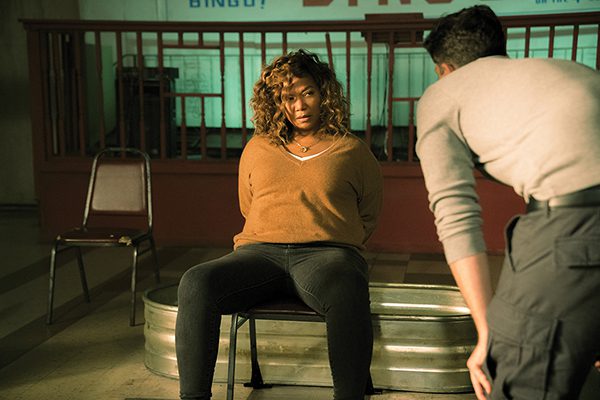
Photo: Michael Greenberg/CBS
“He was involved every step of the way,” says Latifah. “He was in every meeting. He was on every pitch. He was just so excited with the idea of this show being rebooted, and being rebooted with me as the lead.”
In the current “reboot era” where seemingly every classic show and movie is getting a new life, Latifah says she and Lindheim discussed how the storyline is still relevant today.
“Seeing someone who jumps in and stands up for someone who can’t fight for themselves is something I think we all have in our hearts somewhere,” says Latifah.
“You fall in love with shows and then they go away and then you miss them,” she adds. “You have a sort of melancholy feeling about it and you wish you could see it again. If a story is rebooted and told in the right way, it develops its own brand new audience, and I think that’s what we’re doing with the Equalizer.”
Highlights of the Queen
“All Hail the Queen,” Queen Latifah’s first album, was released in 1989 when she was 19 years old. One of the few women in an industry dominated by men, Latifah’s songs on the album were about the harassment of women, domestic violence and sexism.
Screen Actors Guild photo: REUTERS/Mike Blake
Playing a waitress in Spike Lee’s “Jungle Fever,” Queen Latifah broke into movies at age 21.
She launched her TV career in the early ’90s with a guest appearance on “The Fresh Prince of Bel Air.” She later starred in “Living Single,” a sitcom about professional Black roommates that lasted for 5 seasons.
By the 2000s, her credentials expanded to include stints as an author, TV-show producer, entrepreneur, real-estate developer and Broadway musical star. In 2013, she starred in daytime television’s “The Queen Latifah Show.” The show ran 2 seasons.
Latifah has won a Grammy, Emmy, Golden Globe, 3 Screen Actors Guild awards and 2 NAACP Image awards. She was nominated for an Oscar for her role in “Chicago,” and she was the first hip-hop artist to receive a star on the Hollywood Walk of Fame.
Her latest project, The Equalizer on CBS, was watched by 20 million people when it premiered earlier this year.


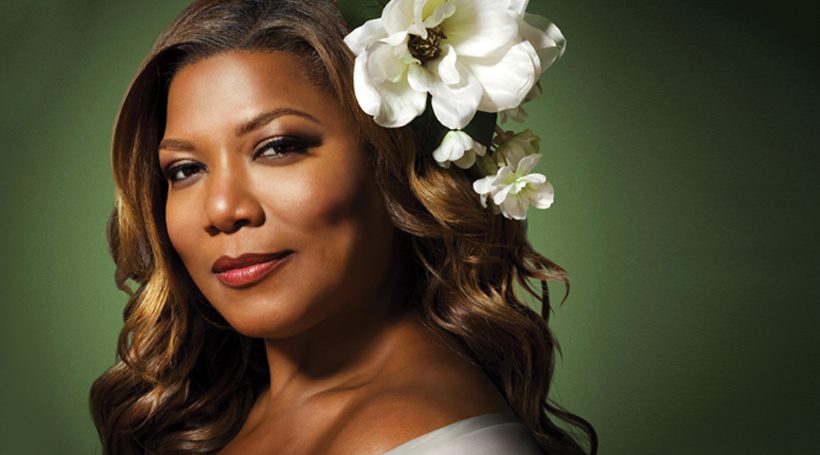
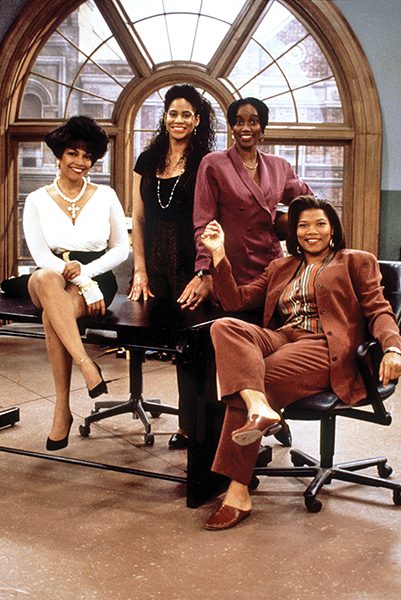 “All Hail the Queen,” Queen Latifah’s first album, was released in 1989 when she was 19 years old. One of the few women in an industry dominated by men, Latifah’s songs on the album were about the harassment of women, domestic violence and sexism.
“All Hail the Queen,” Queen Latifah’s first album, was released in 1989 when she was 19 years old. One of the few women in an industry dominated by men, Latifah’s songs on the album were about the harassment of women, domestic violence and sexism.